|
|
|
Sort Order |
|
|
|
Items / Page
|
|
|
|
|
|
|
| Srl | Item |
| 1 |
ID:
098858
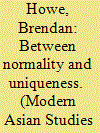

|
|
|
|
|
| Publication |
2010.
|
| Summary/Abstract |
To many observers Japanese decision-making is an enigma that defies conventional analysis. Neither the traditional rational actor model of decision-making, nor alternative pluralist models proposed for the analysis of Western democracies fit the Japanese case. As a result Japanese security policy decision-making is described as 'reactive' or even non-existent. Likewise, the anomaly of Japanese decision-making is ultimately predicted to be resolved through a process of 'normalization' whereby Japanese policy formation evolves into a form that does fit these models. However, this paper contends that the fact that Japan's security decision-making does not fit commonly-used models is due rather to the limitations of those models. Japan's security policy, like that of all states, is gradually evolving, but this does not mean that it is about to become just like the West. This paper addresses how a conjuncture of external factors and internal factors has stimulated important changes in Japanese security policy-making which are frequently missed or misinterpreted by observers. In order to understand Japanese security policy-making, and to chart its future course, a refined cybernetic approach is introduced.
|
|
|
|
|
|
|
|
|
|
|
|
|
|
|
|
| 2 |
ID:
098861
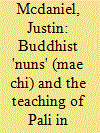

|
|
|
|
|
| Publication |
2010.
|
| Summary/Abstract |
This paper presents an ethnographic account of Buddhist 'nuns' involved in the teaching of Pali language and Abhidhamma in contemporary Thailand. It also reflects on both the emic-Buddhist (Pali and modern vernacular) and etic-interpretative (English-language) vocabularies which have been used to describe these women and their social role(s) and status(es). The aims of the paper are to go beyond the Weberian vocabulary usually used to describe what we will call 'professionally celibate Buddhist women', to escape from the ubiquitous emphasis on the issue of re-establising the Nuns' Order (bhikkhuni--s) in the modern world in scholarship dealing with such women, and to encourage further ethnography and further civilizational interpretation of gender and asceticism.
|
|
|
|
|
|
|
|
|
|
|
|
|
|
|
|
| 3 |
ID:
098856


|
|
|
|
|
| Publication |
2010.
|
| Summary/Abstract |
Even after the Russo-Japanese War, Manchuria remained the powder keg of East Asia. In the war's aftermath, three empires, the Qing, the Russian and the Japanese, stationed their troops in Manchuria, in a struggle for military supremacy there. There has already been a considerable amount of research on these military activities. However, previous works have not discussed them from a triangular relationship. This paper contends that the history of modern East Asia cannot be understood until one examines the shift in the military balance in Manchuria from a triangular comparative point of view. The results of such examination show that, in Manchuria, each empire was unable to establish military domination alone, and therefore needed an alliance partner. During the Xinhai Revolution, the Russia-Japan 'alliance' wielded overwhelming military power against China. However, after the Russian Revolution in 1917, Japan renounced cooperation with a weakened Russia and built a new partnership with China to advance the Siberian intervention. The military triangle of Russia, China and Japan was unable to create a comprehensive regional security system in Manchuria because what was established was based on mutual distrust and fear.
|
|
|
|
|
|
|
|
|
|
|
|
|
|
|
|
| 4 |
ID:
098863
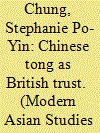

|
|
|
|
|
| Publication |
2010.
|
| Summary/Abstract |
By the nineteenth century, with the advance of British colonial activities, British corporate laws had been transplanted to maritime Asia with varying degrees of vigour. In British Hong Kong, these laws often clashed with native customs. Through a reconstruction of the legal disputes found in urban Hong Kong, this paper discusses how British and Chinese business traditions interacted with each other during the late nineteenth and early twentieth centuries. Before assessing the historical implications and consequences of these legal decisions, this paper will also explore whether the Chinese institution of tong is compatible with British law in urban Hong Kong.
|
|
|
|
|
|
|
|
|
|
|
|
|
|
|
|
| 5 |
ID:
098855
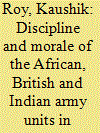

|
|
|
|
|
| Publication |
2010.
|
| Summary/Abstract |
Towards the end of World War II, the morale of British units stationed in Burma and India was on a downslide. In contrast, the morale of Indian units was quite high. In fact, after the 1943 Arakan Campaign, the morale of Indian units rose slowly but steadily. The morale and discipline of Indian troops are also compared and contrasted with another colonial army: the African troops. By making a comparative study of the Commonwealth troops deployed in Burma and India, this paper attempts to show how and why the contours of morale and discipline changed among the various groups of troops at different times. The study of morale and discipline of the troops deployed in these two regions represents two extreme conditions: while Burma remained a war front, India did not experience any actual warfare except for some skirmishes with Indus tribes at the northwest frontier. In general, bad discipline is partly responsible for bad morale and vice versa, which adversely affects the fighting power of armies. This turns to the issue of 'why do men fight'? The 'will to war' is directly proportional to good discipline and strong morale amongst troops. This paper will look for the causative factors shaping discipline and morale of both metropolitan and colonial soldiers, based mainly on military intelligence reports on morale. We will see that rather than grand ideas like nationalism and anti-fascism, mundane factors like the supply of good rations, access to sex and service conditions, influence the morale and discipline of soldiers, and hence their combat-worthiness.
|
|
|
|
|
|
|
|
|
|
|
|
|
|
|
|
| 6 |
ID:
098854
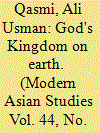

|
|
|
|
|
| Publication |
2010.
|
| Summary/Abstract |
This paper evaluates in detail the policies adopted and the religious ideas held by the power elite of Pakistan during the years from 1947 to 1969. It has been argued that the religious worldview of the power elite was shaped by the discourse of Islamic modernism which allowed envisioning of a state in which (at least theoretically) democracy, rights of minorities, sovereignty of the parliament and flexibility of Islamic laws could be propagated as the guiding principles of the state. Also, by focusing on the life and ideas of Ghulam Ahmad Parvez and by disclosing the details of his close connivance with General Ayyub Khan during the 1960s, the paper will highlight the steps taken to institutionalize Islamic modernism in Pakistan.
|
|
|
|
|
|
|
|
|
|
|
|
|
|
|
|
| 7 |
ID:
098860


|
|
|
|
|
| Publication |
2010.
|
| Summary/Abstract |
This paper analyses the trajectories of handicraft cloth production in three major sub-regions of Jiangsu Province in the late nineteenth and early twentieth centuries. In contrast to traditional focus on the bankruptcy of rural handicrafts in the face of competition from the modern industry, it argues that the fate of handicrafts depended on the specific characteristics of each sub-regional economy. Thus in Song-Tai, handicraft weaving declined as labour was drawn off into modern industry. In Tong-Hai the availability of machine-spun yarn in the market enabled the development of a commercialised handicraft weaving sector. Finally, in Xu-Huai-Hai machine-spun yarn enabled the inhabitants to substitute their own subsistence handicraft production for cloth purchased from elsewhere.
|
|
|
|
|
|
|
|
|
|
|
|
|
|
|
|
| 8 |
ID:
098853


|
|
|
|
|
| Publication |
2010.
|
| Summary/Abstract |
One of the most contentious political issues in postcolonial India is the unfulfilled project of a 'uniform civil code' which would override the existing 'personal laws' or religion-based laws of domestic relations, inheritance and religious institutions. If the personal laws are admitted to be preserved (if somewhat distorted) remnants of 'religious laws', then the legitimacy of state intervention is called into question, especially since the Indian state claims to be secular. This paper, by discussing the history of the lesser-known Christian personal law, demonstrates that this conundrum is of considerable heritage. From the earliest days of British imperial rule in India, the quest to establish a universal body of law conflicted with other legal principles which upheld difference: that of religion, as well as race. It was the historical role of Indian Christians to occasion legal dilemmas regarding the jurisdictions of British and 'native' law, and concurrently about the identity of people subject to those different laws. In trying to discover who the Indian Christians were, and what laws ought to apply to them, British judges had perforce to reflect on who the 'British' were, whilst also dealing with conflicting collective claims made by Hindus, Muslims, Parsis, and Christians themselves about their own identity and religious rights. The Indian Christian personal law was an unintended by-product of this process, a finding which throws light both on the dynamics of colonial legislation, and on the essentially modern nature of Indian personal laws.
|
|
|
|
|
|
|
|
|
|
|
|
|
|
|
|
|
|
|
|
|